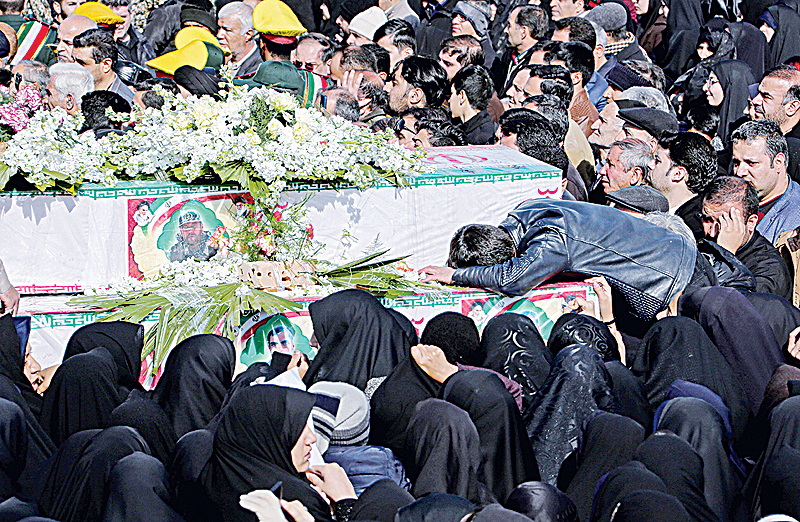Iran takes aim at ‘hateful’ Pence comments

TEHRAN: Iran’s foreign ministry yesterday summoned the Pakistani ambassador after Tehran accused Islamabad of harboring a jihadist group behind a deadly suicide attack on security forces. “The Islamic Republic of Iran expects Pakistan’s government and army to seriously confront … the terrorist groups active on its border with Iran,” the foreign ministry said in a statement. An Iranian official at the ministry called on Pakistan to quickly take the necessary steps for the identification and arrest of the attack’s perpetrators.
The suicide bombing on Wednesday killed 27 members of Iran’s Revolutionary Guards travelling on a bus in the volatile southeastern province of Sistan-Baluchistan, which straddles the border with Pakistan. The attack was claimed by the jihadist outfit Jaish al-Adl (“Army of Justice”). It was formed in 2012 as a successor to the Sunni extremist group Jundallah (Soldiers of God), which waged a deadly insurgency for a decade before it was severely weakened by the capture and execution of its leader Abdolmalek Rigi in 2010.
Iran Revolutionary Guards commander Major General Mohammad Ali Jafari on Saturday blamed Pakistan’s army and Inter-Services Intelligence agency for sheltering the jihadists. “The government of Pakistan must pay the price of harboring these terrorist groups and this price will undoubtedly be very high,” Jafari told mourners gathered at funerals for the dead in the city of Isfahan. Iran’s supreme leader Ayatollah Ali Khamenei has also linked the perpetrators of Wednesday’s attack to “the spying agencies of some regional and trans-regional countries”.
‘Hateful’ comments
Meanwhile, Iran’s foreign minister yesterday launched a blistering attack on US Vice President Mike Pence, saying his allegations that Tehran was plotting a “new Holocaust” were “hateful” and “ignorant”. Mohammad Javad Zarif told the Munich Security Conference that Pence’s demands for the EU to follow the US in abandoning the 2015 Iran nuclear deal amounted to asking Europe to undermine its own security. And Zarif piled fresh pressure on the EU, telling Brussels that a trade mechanism to bypass US sanctions on Iran was inadequate and it needed to do more if it wanted to save the accord.
US President Donald Trump tore up the nuclear deal last year, branding it a failure, and Washington has slapped swingeing sanctions back on Tehran. Pence used a diplomatic tour of Europe this week to demand repeatedly that EU countries stop trying to preserve the deal, which curbed Tehran’s nuclear ambitions in return for sanctions relief. Zarif slammed the vice president, saying he had “arrogantly demanded that Europe must join the US in undermining its own security and breaking its obligations” to the treaty under international law.
“His hateful accusations against Iran including his ignorant allegations of anti-semitism (…) are both ridiculous but at the same time very very dangerous,” Zarif said. Away from the fiery rhetoric, Zarif’s criticism of INSTEX-the payment mechanism created by European countries to try to continue trade with Iran-will cause concern in Brussels. The creation of INSTEX by Britain, France and Germany-the so-called E3 European signatories to the nuclear deal-was a complex, drawn-out process that has infuriated the Trump administration, exacerbating transatlantic tensions.
But while Zarif welcomed the EU’s political support, he said it was not enough, and demanded Europe “walk the walk”. “INSTEX falls short of the commitments by the E3 to save the nuclear deal,” he said. “Europe needs to be willing to get wet if it wants to swim against the dangerous tide of US unilateralism.” He warned that the future of the nuclear deal was “on the brink”, saying that while polls showed 51 percent of Iranians still supported staying in, there were many who thought Tehran had got a bad deal.- Agencies









